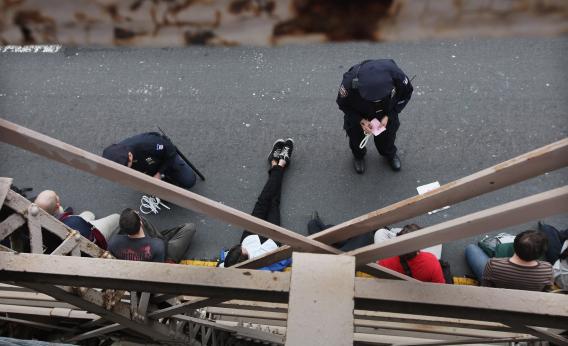Twitter surprised and impressed civil liberties groups this summer by taking a stand on behalf of an Occupy Wall Street protester’s privacy. Ordered by the judge in a New York criminal case to dredge up and hand over deleted tweets from activist Malcolm Harris (@destructuremal), Twitter fought back and appealed, arguing its users own their own Twitter data. Groups such as the Electronic Frontier Foundation and the ACLU joined the fight on Twitter’s side.
The government, though, played dirty. Judge Matthew Sciarrino, Jr. this week told Twitter on Tuesday that if it didn’t fork over Harris’ data within three days, it would face contempt of court and a stiff fine. That’s not the dirty part. As Sciarrino noted, “I can’t put Twitter or the little blue bird in jail, so the only way to punish is monetarily.” The dirty part is that Sciarrino claimed that, in order to determine the appropriate fine, he would need Twitter’s financial records from the past two quarters. That’s anathema for a private startup clawing to keep its competitive edge, as Sciarrino surely knows.
The company’s response was predictable. “They’re going to tweet like canaries,” the New York Post reported this morning. Indeed, Reuters reports that the company asked the judge “pretty please” one last time in court on Friday, then gave up the goods. Harris’ records will remain under seal pending another appeal from his own lawyers next week.
Some will be tempted to blast Twitter for rolling over. The charges against Harris are petty—disorderly conduct, with a maximum fine of $250, stemming from his arrest along with 700 other protesters on the Brooklyn Bridge last October—but the precedent is significant. Sciarrino is sending the message that Internet companies don’t have the right to fight for their users’ privacy.
For Twitter, though, this was an impossible situation. It’s too much to expect a private company to sacrifice its own right to keep its finances under wraps just so it can pursue a costly legal appeal that it might not win anyway.
Even the Electronic Frontier Foundation doesn’t really blame the company for its decision Friday. “I feel bad for them. I think they were trying to do the right thing,” EFF staff attorney Hanni Fakhoury told me. Given how minor the criminal charges against Harris are, he added, “it feels like the New York City prosecutors are using this as an attempt to get the law shaped in a way that they think is beneficial for them, and to kind of make a point about it. The fact that there won’t be this chance for it to run up the appellate courts is unfortunate.”
Twitter had no comment, but referred me to a statement that its outside counsel, Terryl Brown, made in court Friday morning. Turns out Brown made essentially the same argument:
As a pure matter of law, today Twitter is being given a fundamentally unfair Hobson’s choice that is contrary to the core of our justice system of being compelled to either waive its right to appeal so that novel legal issues may be adjudicated on the merits, or being held in criminal and/or civil contempt. …
